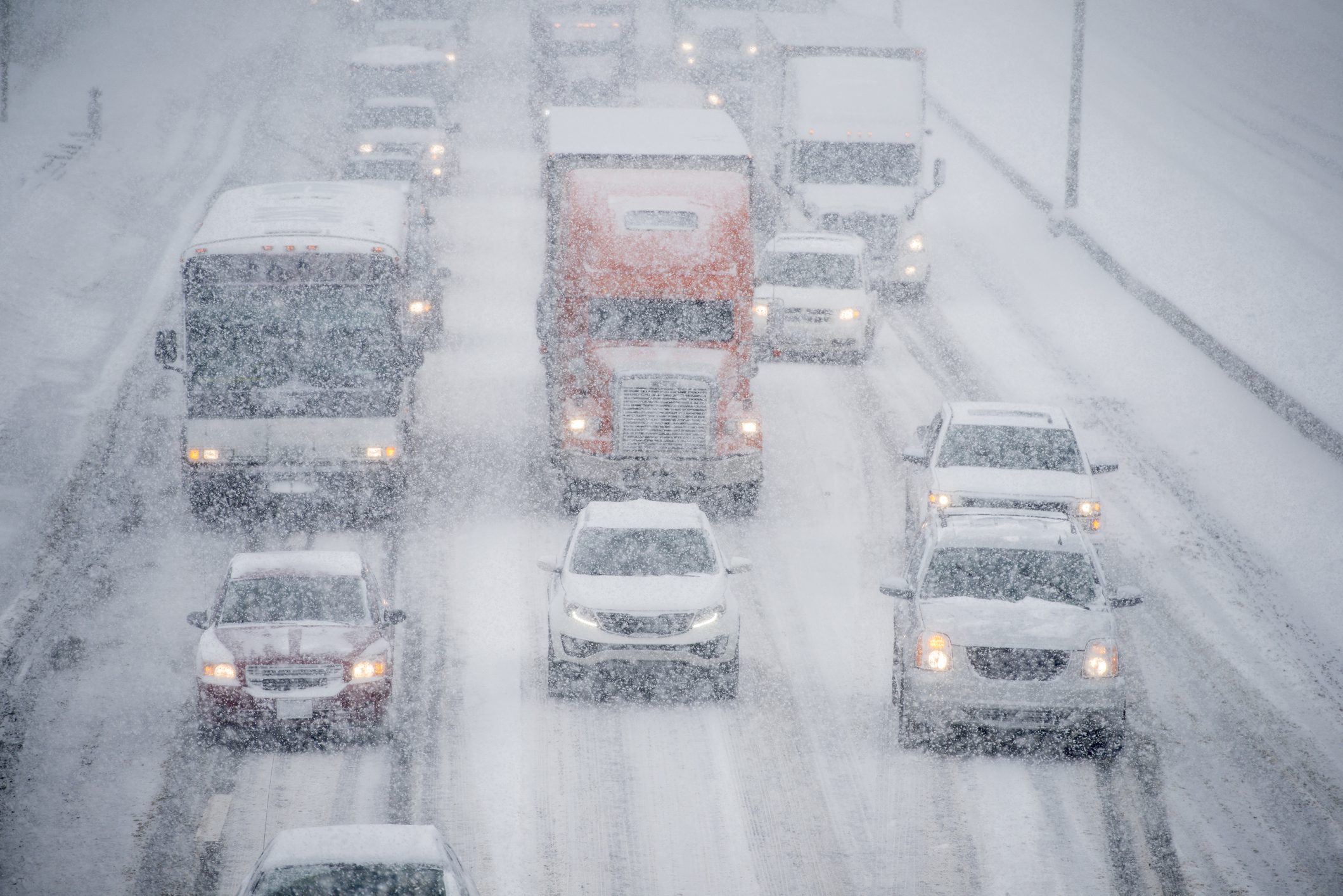Driving a truck in the winter is not an easy task and requires a specific set of skills, expertise, and experience to drive safely. It is important to adopt safety precautions when truck driving in winter because the chances of encountering an accident increase drastically. Most importantly, drivers who like trucking in snow or on icy and slippery surfaces should be more careful. According to stats, 15% of the accidents take place during snow or sleet weather.
The chances of accidents increase if you ride heavy vehicles like trucks. Having the right knowledge about driving in the winter can help reduce the risk of accidents. Therefore, we will discuss the most effective tips to help you make trucking in snow easier and safer.
Tips for Winter Driving
Following are some of the winter driving tips for the trucker that every professional driver should know of.
Drive Slow
Over-speeding is the biggest reason for truck crashes throughout the year. However, the risk gets much higher when you drive on a slippery road. Driving at speed limits may be legal, but it still isn’t safe during the winter. We suggest you go slower than the speed limit and take as much time as it takes to reach your destination. It is the top rule for truck safety, and truckers should always follow it.
Don’t Travel as Part of a Pack
A common mistake that most truckers make is to travel as part of a pack. While that seems like a good idea, it is best to drive alone because you might also get in trouble if even one of these vehicles gets into an accident. Always maintain maximum distance between your truck and the other vehicles as it will help you stay in control while you are on the road.
Leave Plenty of Space
You must maintain a good distance when driving in snow. Most truck drivers drive very close to other vehicles trying to cover the max distance. However, that does not always give the drivers enough time to hit the brake and slow down if they drive fast.
Always make sure to maintain maximum stopping distance; you should have enough space between your vehicle and the truck/car in front of you and on the sides so you can slow down or speed up when needed. This little tip can save you from crashing into other cars/trucks while you are on the road.
Never push Your Vehicle
Truckers moving in snow often find empty roads when they travel. These truckers try to cover the maximum distance by speeding on the icy roads. This doesn’t work very well because drivers usually push their vehicles to the limit, which leads to mechanical problems and accidents. You should know what your truck equipment can handle and choose accordingly.

When it comes to truck driving in snow, poor braking technique is one of the main reasons why most heavy vehicles slip and get into accidents.
Use Kitty Litter
Your vehicle can get stuck on a slick road or in a snowbank in winter. Moreover, it is important to clear the snow before you hit the road. Pouring kitty litter around your tires helps create traction to get your truck out. It is an environmentally friendly way to keep your truck driving safe during snowy weather. It can also help provide extra traction that makes driving on slick roads safer.
Reschedule Package Delivery
It is understandable if you are unsure about taking your truck out in the snow. You should wait if you think it is too much for you to handle. This way, you can prevent yourself from getting into an unwanted situation by rescheduling your delivery.
Clear the Windshield
Fog and snow build-up on the windscreen is a common problem that most truckers need to deal with when they drive in the snow. However, you cannot pour water over it since it will also freeze as you drive through the cold weather. So, how are you supposed to clean your windshield? The best way is to turn on your defroster for some time. The heat from the defroster will melt any snow residue and clean your windscreen easily.
Similarly, pouring alcohol on the glass is another effective option as it evaporates quicker than water and doesn’t have enough time to freeze on the glass. You can also put a few ounces of brake line anti-freeze with the washer fluid to avoid this problem.
Carry Tools with You
Cold wind, fog, and snow are common problems in winter, which is why truckers should have the right tools with them while heading out. As a trucker, you should know that any water content in the fuel or air tank can freeze quickly and clog fuel pick-up, making it harder for you to drive.
So, we suggest you check the air system, fuel tank, and fuel lines from time to time when you have been traveling for long hours. Do not think that the heat from your engine will melt the snow underneath as the compressed air is cooler. It will eventually freeze again and form a layer on the metal.
Check Tail Lights
Ensure quickly inspecting your vehicle each time you stop. This includes taking a good look at the tail lights and the license plate, as they can easily get covered in snow because of the drag. Ensuring high visibility for fellow drivers is one of the most important ways to ensure safety while truck driving in snow.
Avoid Stopping on the Road Shoulder
Visibility can drop drastically, especially when you are in blinding snow. Thus, it is important to avoid stopping at the shoulder of the road because it will make other drivers think that you are on the road, resulting in a collision. Always ensure stopping your vehicle on the side of the road away from the main traffic.
Don’t Put Yourself and Others at Risk
Driving in the snow on slick roads often results in late package deliveries. There will be times when you will not make your deliveries on time, but it is not something you should take to your heart.
Hours of service rules, late orders, and engine breakdowns are just a few reasons for delays. It will put some extra pressure on you and put your life at risk. However, you need to think with a clear head and resume driving only when you know you can make it to the destination safely.
Hit the Brakes Correctly
Since we are talking about winter driving tips for the trucker, it is important to recognize that poor braking technique is one of the main reasons why most heavy vehicles slip and get into accidents. It is best to avoid overusing your brakes when you are out on an icy road.
Never hit the break instantly unless the whole unit is straight as your truck or trailer can slide off and spin you off track. This is because the truck may slow down when you hit the brake, but the trailer behind it does not. You may lose control while driving in this case.
SEE ALSO: Automatic Semi Truck Transmissions vs. Manual Truck Transmissions
Check the Fuel Tank
Keeping a full tank helps keep extra weight on the tires for better drive traction. We also suggest having good quality lug tires and enough fuel to weigh down the tires while driving in the snow. Plus, having enough fuel will save you from the hassle in case you cannot find a refill station around you.
Keep an eye on Trailer Tires
Always pay attention to your truck tires, especially when you have connected them to a trailer. There are few things that you should check during this time; for example, you should check if the tires are turning properly by:
- Checking for frozen valves
- Frozen shoes for the brake drums.
If you find any of these situations, you should get under your truck, hammer the ice layer while keeping the red button on. It can also help you check if one or more tires aren’t turning properly.
Related Questions
You may have several other questions regarding trucking in snow. We will address the most common ones for your guidance. So, take a look.
Is it hard to drive a truck in winter?
Yes, it is fairly difficult to drive a truck in the snow, especially when you do not have the training, tools, and experience to handle the heavy-duty vehicle in extreme weather conditions.
How do truckers stay warm in winter?
Truckers need to ensure that they stay warm during the winter. For this reason, they must carry the following essentials with them.
- Gloves
- Lined waterproof, winter boots
- Food (dried foods/water supply)
- Warm clothing
- Extra blankets and/or sleeping bag
- Insulated socks
- Winter jacket
Conclusion
Handling your truck in the winter is fairly difficult for many reasons, including road safety issues, car maintenance issues, and snow on the road. However, our winter driving tips for the trucker will help you stay safe during your winter trucking adventures.
Ensure that you follow these tips to have a safe and sound journey even during the winters. You can reach out to us if you have further queries regarding winter trucking safety, as we would love to help you out.
Sources
